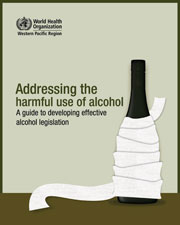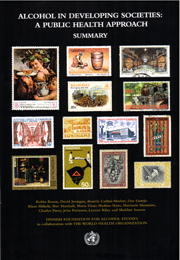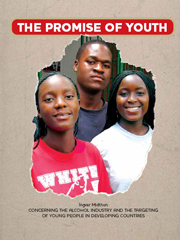
WTO negotiations and alcohol policy
There are new movements in the WTO negotiations, also on the issue with the greatest relevance for alcohol policy; namely the Disciplines on Domestic Regulations. Below is a brief update.
Informal talks have been conducted more or less continuously since the breakdown of the WTO negotiations in August 2008. The upcoming Ministerial Meeting in Geneva 30 November – 2 December has spurred new activity and also negotiations on a more formal level.
WTO Ministerial Meeting in Geneva The topic of the Ministerial Meeting is a rather open one; “The WTO, the Multilateral Trading System and the Current Global Economic Environment”. Both the WTO secretariat and member states are cautious not to raise too high expectations towards the outcome of this meeting. This may reflect the reality but may also be a tactical move to facilitate the negotiations.
Disciplines on Domestic Regulation
The most critical discussions for alcohol policy issues are taking place in the Working Party on Domestic Regulations (WPDR) and on the draft for Disciplines on Domestic Regulations. These new Disciplines will, if they are adopted, influence a very important issue in alcohol policies; the right of governments to regulate trade in services related to alcohol; licensing systems, monopolies, marketing etc.
It is critical to understand that these new restrictions on domestic regulation go beyond prohibiting “non-discriminatory” regulation. Discriminatory regulations, ones that create heavier obligations for foreign companies, can already be challenged under the GATS.
With the proposed disciplines, completely non-discriminatory regulations could be challenged at the WTO for not being “necessary”, “objective”, or “relevant”. For example, even if exactly the same regulations are applied to foreign and local alcohol advertisers, without discriminating in any way against foreign ones, these regulations could still be challenged using the proposed disciplines.
Three service sectors are of particular concern: Retail sale of alcohol, Hotels, restaurants and bars and Advertising and marketing. If governments have not taken reservations in their commitments in these areas, any new disciplines will apply in full to these sectors. The situation is probably that most countries have not taken any reservations that are relevant to alcohol policy.
The right to regulate
The draft disciplines state that governments still have the right to regulate. But two separate WTO dispute panels, the US – Gambling panel in 2005 and the China – Publications panel in 2009, have ruled that a government’s right to regulate is limited by the GATS obligations they undertake. By agreeing to the proposed disciplines, governments will be accepting strict limits on their right to impose non-discriminatory regulations.
The necessity issue
The last couple of years the most serious conflicts have been on the necessity issue: Shall the new Disciplines include formulations that repeat and even specify more in detail the general statement in the GATS agreement that any regulation of trade in services “are not more burdensome than necessary…” (Article VI, 4). This is linked to the question of “necessity testing”, i.e. the right of governments to test in a WTO panel if regulations introduced by other governments on trade in services (like sale and marketing of alcohol) are more burdensome than necessary to ensure the quality of the service. In the draft text from 2008 all references to necessity and to necessity testing were taken out because of objections from many countries.
Positions have changed
The latest rounds of discussion in the Working Party on Domestic Regulations show that the situation has now changed:
- India, South Africa, Chile, Australia and a number of other countries are now advocating rather strongly for an inclusion of necessity formulations in the new Disciplines;
- In a meeting of the WPDR in April the chairman was rather heavily criticized for not suggesting stronger formulations on the necessity issue;
- Many countries are now referring to the new situation after the financial crisis as evidence of the need to avoid new regulations and “neo-prohibitionism”. A paradox, but still a reality of the WTO culture.
- The US is now advocating against any formulation on necessity, probably as a result of NGO lobbying domestically and the fear of facing a number of WTO cases challenging American domestic legislation.
- In a WPDR meeting 9 October Australia raised a proposal to reinstate “the necessity test” into the Disciplines.
- The European Community is reported to have objected to this – on the basis that the proposal had already been rejected in earlier discussions, and bringing it back into the text would alter the balance reached in the Chair’s text.
Concepts without definitions
Ellen Gould from Canada, who is following the GATS negotiations very closely, has pointed that even the existing draft of the disciplines (which does not include “necessity”) would still create many new ways for regulations to be challenged at the WTO. The problem is that these concepts are not yet defined, which could mean that they later can be interpreted and used to challenge government regulations:
- "pre-established" - no-one knows what this means. Does it mean that once a license is given out - say for a pub, a broadcaster, a bank - that regulations can never change because they weren't established prior to application for the license?. So here is probably the worst aspect of the proposed disciplines, and especially of concern to a new government that may want to tighten regulation.
- "objective" - controls on alcohol advertizing or advertizing to children would be an example of where subjective judgments by regulators have to come into play
- "relevant" - would this exclude regulatory concerns that are not "relevant" to the specific service such as environmental concerns around construction development?
Challenges now
In order to protect the right of governments to regulate alcohol sale and marketing in the future, there are at present two issues of special concern in the GATS negotiations:
- To avoid formulations on necessity in the Disciplines on Domestic Regulation – by securing that enough Western and developing countries support this position in the WPDR negotiations;
- To ensure disciplines like “ pre-established”, “objective” and “ relevant” are deleted from the draft disciplines if they cannot be defined in a way that preserves a government’s right to regulate.
![]()
![]()
Developed with CustomPublish CMS by Nettinfo AS




